12 Money-Saving Tricks Every Homeowner Needs to Know
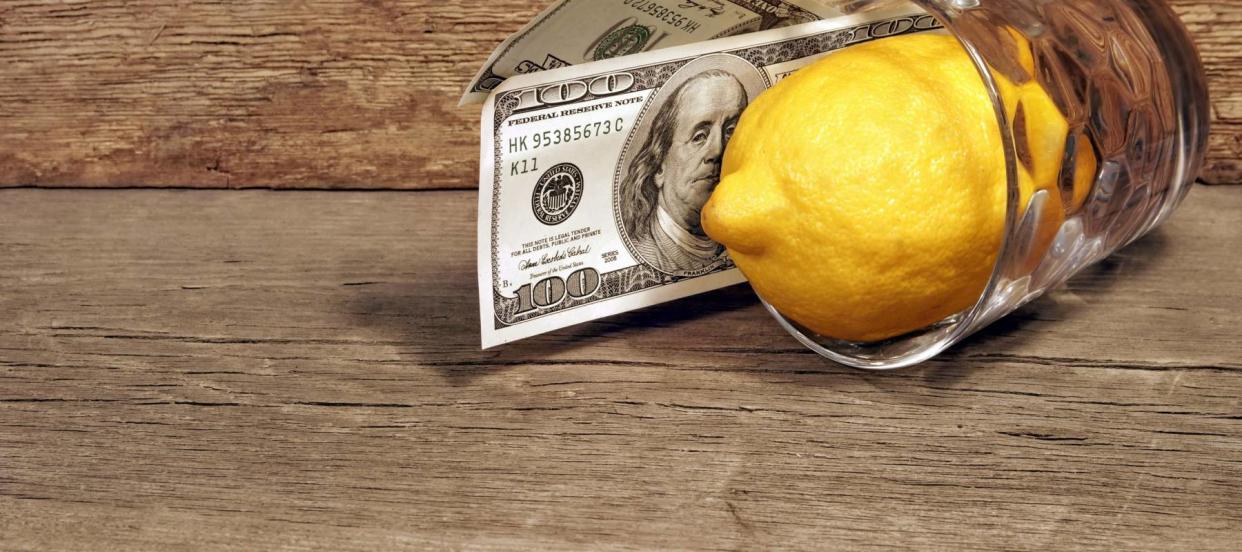
Food delivery apps and little robot vacuum cleaners have made dinnertime and cleaning easier for homeowners -- but takeout and gadgetry can get expensive. Lucky for you, there are plenty of ways to save money around the house that are pretty easy, too.
With just a little bit of time and ingenuity, you can cut the costs of various odd jobs, trim your home-related spending and beef up your household budget.
Having an open mind helps, too. Because some of these tips may sound a little nutty.
Here's how you can cut your spending, one chore or bill at a time.
1. Embrace nature's powerful cleaner

Baking soda and vinegar can work miracles together
Vinegar is nature’s cleaning powerhouse. When paired with baking soda, it melts grease off the grimiest pan. It works better than many commercial products for glass and windows — and is even an effective carpet cleaner.
Try this the next time there’s an unfortunate spill: First, blot the stain, absorbing as much of it as you can with paper towels. Then, dampen the area with cold, clean water and blot again, without rubbing.
Finally, soak whatever stain is left with white vinegar. The acid in the vinegar releases the bond between substances and carpet fibers. Voila — good as new!
2. Refinance your mortgage at a lower rate

You may be able to save a serious amount of money by refinancing your mortgage.
Mortgage rates fluctuate, and today's rates may be lower than when you bought your home. So, you might refinance your mortgage to knock down your monthly payment and potentially save thousands of dollars in interest costs over the life of the loan.
A simple mortgage calcuator will show you that a 30-year, $200,000 mortgage has a $1,074 monthly payment at 5% — but a $1,013 monthly payment at 4.5%.
Over 30 years, a borrower would pay total interest of about $187,000 with the 5% loan, but around $165,000 at 4.5% — a savings of roughly $22,000!
To decide whether a refi is worth it, be sure to consider other factors including closing costs and how long you're likely to stay in the home.
3. Smooth out pesky carpet 'dents'

Ice cubes can smooth out carpet dents
The downside of having a fluffy carpet is that furniture sitting on it will eventually leave unsightly "dents." But you can smooth them out without hiring a professional to massage your carpet back to life.
The next time you uncover carpet dents, grab an ice cube. Put one cube on each indentation and wait for it to melt.
Once it’s melted, wipe up the liquid and fluff up the fibers. Dent be gone!
4. Make furniture shopping more rewarding

Using the right credit card might save you a lot of money on furniture.
When it's time to shop for a new couch, lamp or area rug, do some research so you'll choose the right credit card for the job and maximize your savings.
You might, for example, discover that the Target REDcard will save you 5% on what you buy at the cheap-chic discount retailer.
If you make your purchases with a cash-back credit card, typically up to 2% of the money you spend will be put back in your pocket. And, the U.S. Bank Cash+ card allows you to earn a even better 5% back at furniture and electronics stores.
For major appliances and other more expensive items, consider opening a new 0% credit card, and pay off those big-ticket purchases interest-free for up to 21 months.
5. Refresh your microwave
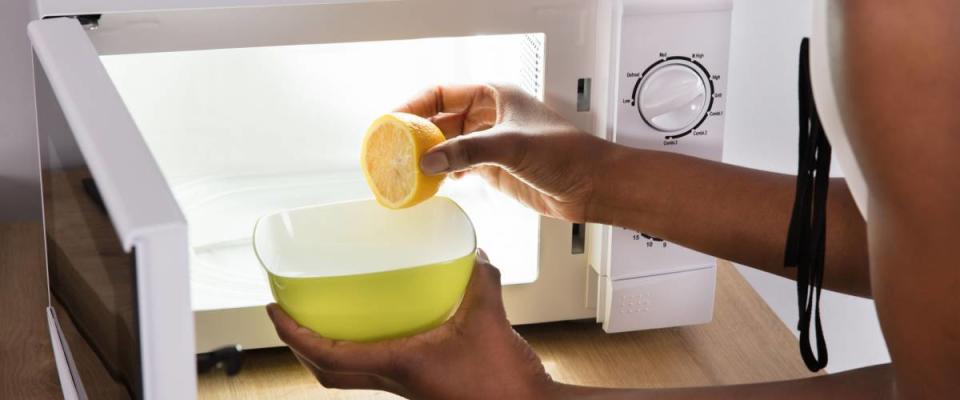
Refresh your microwave with lemon.
Of all the appliances in the home, microwave ovens take a particularly hard beating. And since their doors are kept shut, we can forget to clean them.
When you’re ready to show your microwave some love, don’t run to the store to buy special products that may use harsh chemicals.
Instead, fill a small bowl with lemon juice and water, and microwave it on high for one to two minutes. Remove the bowl and wipe down the microwave for a squeaky-clean interior and a lemony-fresh scent.
6. Combat high energy bills

Use caulk to seal out drafts
In the winter, cold air can creep in through small gaps around your windows and doors, forcing your heating system to work harder. In warm-weather months, the opposite can happen and push your A/C to its limits.
Sealing up these drafty spots with caulk or window- and door-sealing tape or will insulate your home and make it more energy-efficient and less expensive to heat and cool.
Another way to save on climate control is by using a smart thermostat, such as Nest, which will automatically make things less comfortable — but also less costly — when no one is home.
7. Discover the magic of Coca Cola

Coke can be a powerful cleaner.
When your toilet is cursed with unsightly hard water and mineral stains, Coca-Cola can help. In contrast to expensive acid-based cleaners, a 2-liter bottle of the fizzy stuff costs about $1.50.
To get your toilet shining again, just pour some Coke on the stains and watch it magically destroy the mess. And the soft drink's cleaning abilities don’t end there.
The citric acid in Coke is a great rust-remover — and people swear it can even clean lake scum off the bottom of a boat.
8. Put your extra space to work
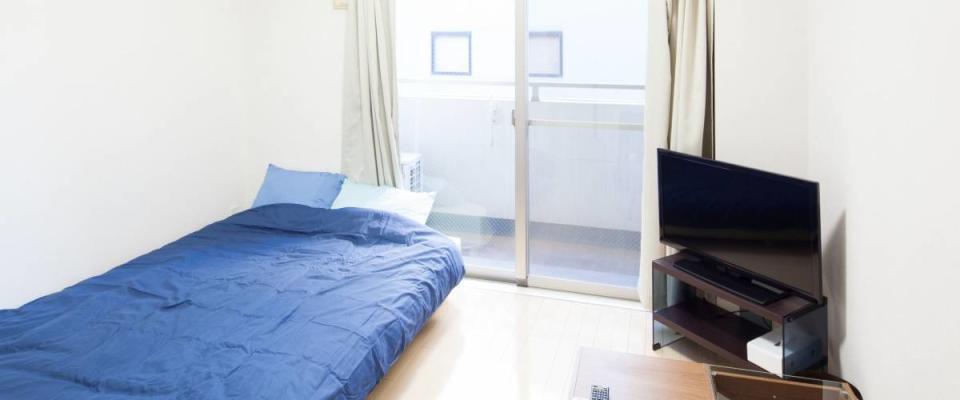
Make some money with that unused guest room.
If you've got a guest room that you primarily use for storage, move the boxes and the bicycle outta there and put that space to work, making money for you — as a room that you rent out to travelers via Airbnb.
You set your rates, rules and availability, while Airbnb provides $1 million in coverage in case of property damage and another $1 million in insurance against accidents.
Airbnb says it has 2.9 million hosts worldwide and that 14,000 new ones come on board every month. One study found hosts make an average of $924 per month.
9. Go power-stripping

Use a power strip to control phantom power drain
Spare bedroom TVs, game consoles, printers and coffee makers all can use power even when they’re turned off. This phantom power drain will snowball over time, and the costs add up.
Instead of plugging these electronics directly into wall outlets, plug them into power strips. Any time the devices aren’t in use, simply cut them off from power by switching off the strip. No more phantom drain.
Just take care not to overload the power strips, because doing that can pose a fire hazard.
10. Turn down your water heater
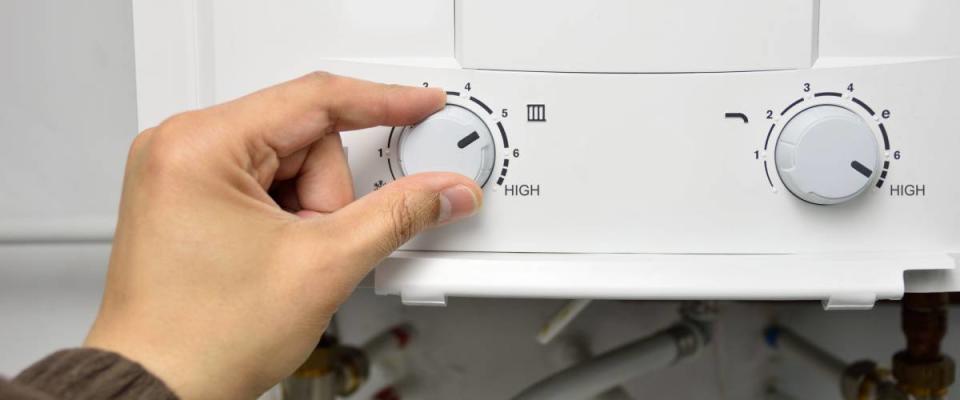
Turn down your water heater and lower your bills
A tank-based hot water heater is like a pot of water simmering on your stove all day. The hot water heater might very well be using too much energy and running up your electric bill.
To test your heater, turn your kitchen tap all the way to the hot setting and see how it feels on your hand. If it’s uncomfortably hot, then your hot water heater is set too high.
Lowering the temperature on your heater can save you money — and you'll still get that nice hot shower each morning without scalding yourself.
10. Borrow smartly for home improvements

Don't pay for home projects with a high-interest credit card.
Let's say you've decided it's finally time to finish your basement, but you don't have enough equity in your home to cover the project via a home equity line of credit.
Whatever you do, don't reach for a high-interest credit card. If you need cash to help pay for the work, consider taking out a lower-cost personal loan.
For example, Upgrade is an online lender offering personal loans in amounts as high as $50,000 at APRs as low as 7.99%. Loans can be repaid in up to five years.
Personal loans can be unsecured, meaning no collateral is needed, though secured personal loans tend to come with lower interest rates.
11. Turn down your water heater

Turn down your water heater and lower your bills
A tank-based hot water heater is like a pot of water simmering on your stove all day. If your hot water heater is on overdrive, it’s using too much energy and running up your electric bill.
To test your heater, turn your kitchen tap all the way to the hot setting. Test the water. If it’s uncomfortably hot, then your hot water heater is set too high.
Lowering the temperature on your heater can save you money — and you'll still get that nice hot shower each morning without scalding yourself.
12. Rev up your scrub
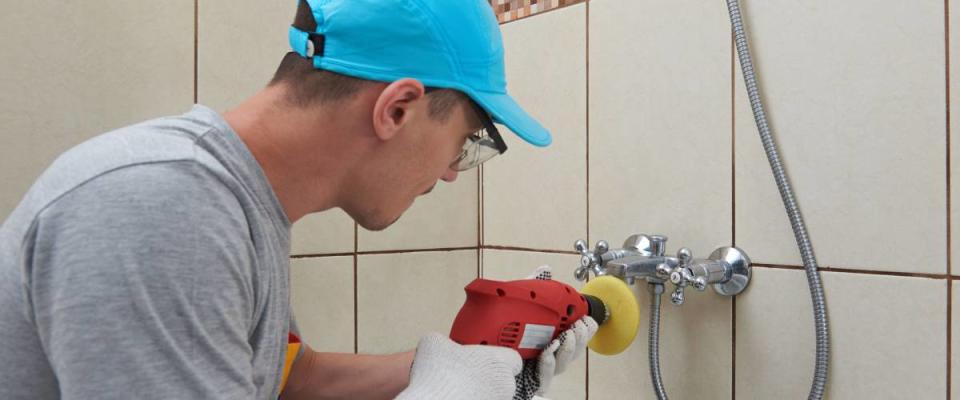
Attach your scrubber to a drill to rev up your cleaning
Removing soap scum in the shower or grime embedded in tile grout may take more scrubbing than your elbow can handle. A scrubber sponge attachment for your cordless drill can give you the power to complete those tough jobs with ease.
If you’re feeling super thrifty, make your own sponge drill attachment by threading a five-inch machine bolt through a stiff round sponge and tightening your drill's keyless chuck around the bolt.
Now that you've learned lots of new ways to save money as a homeowner, don't let it all slip through your fingers. Find an account with a great savings rate and put it away for an emergency — or your retirement.


